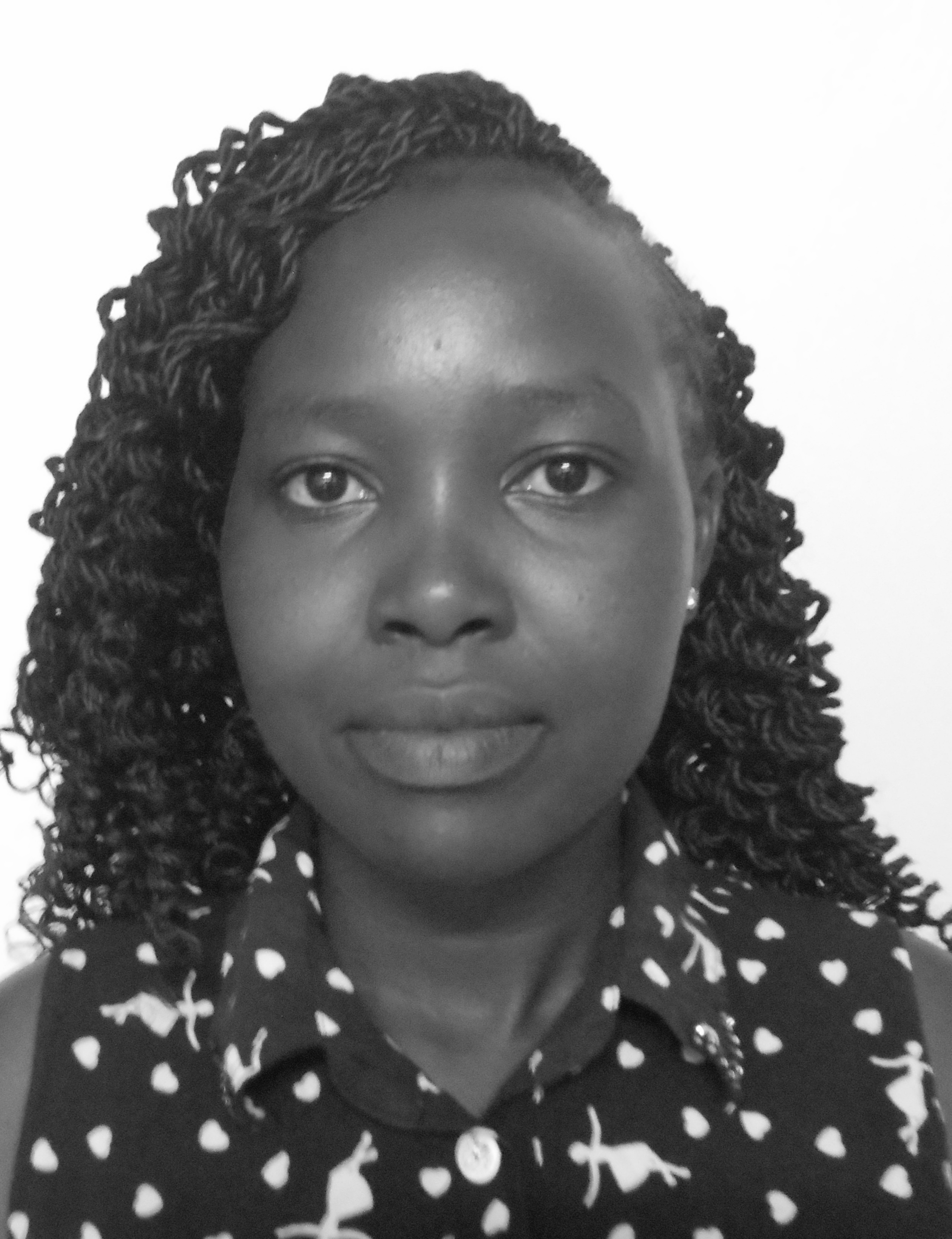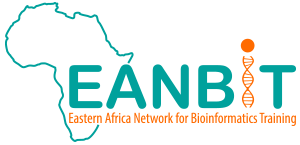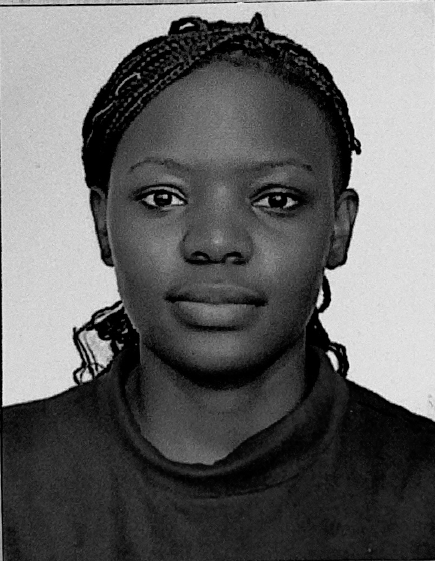COHORT THREE

Gladys Jerono Rotich - Pwani University
After completing my secondary school studies, I did computer studies at Chrisco College
(Nairobi) where I gained skills in basic computer packages. While in the university, I did
units in molecular biology, bioinformatics, statistics, computing and mathematics, this
made me realize how interrelated these fields are and more interestingly, how
molecular biology, mathematics and statistics connected to bioinformatics. After
graduation, I had already developed great enthusiasm for Bioinformatics. I enrolled for an online course, computer programming for everyone, offered by University of Leeds and institute of coding. Here, I was equipped with skills such as writing a basic code, knowing how programming works, solving complex problem with a code and knowing
what a code can do. After learning basic coding skills I developed curiosity and passion
to learn more coding languages especially python. I then applied for the H3ABioNet
Introduction to Bioinformatics Course (IBT) 2020 and was selected under the KEMRI
classroom for three months. The course introduced me to bioinformatics resources and
databases, Linux/UNIX and the command line, sequence alignment and its application,
genomics and molecular evolution and phylogenetics. I also enrolled in a learning circle,
which gave me an opportunity to interact and share ideas with fellow classmates and also great bioinformaticians across Africa. Before completion of my training, I applied for Msc. bioinformatics course under EANBiT scholarship programme 2020/2021 and I was among the lucky candidates who got the scholarship.
We face challenges to experience success. As a bioinformatician, there are a lot of
challenges that needs persistence, practice and hard work. In my first semester, I
experienced challenges in writing python codes because everything seemed new
considering that I was coming from a biological background. I learnt to practice every
evening before bedtime how to code and solve some few python related questions, also
watching youtube videos and looking at what other bioinformaticians have done in sites
like stackoverflow. This improved my skills in writing python code within two weeks.
With the development of new tools and data analysis programmes in biomedical
research, there will be development of new diagnostics,therapeutics, and vaccines and
better understanding of infectious disease mechanisms, pathogen-host interactions and
transmission cycles.
As computational power increases and becomes more accessible, the age of
bioinformatics will accelerate the ability to understand and tackle global challenges like
never before. From discovering new antibiotics to fighting pandemics or making
agriculture more sustainable.
My experience with EANBiT is great so far, I mostly enjoy the fact Biology and Computation are compressed to make great use of BIG data. If I could go back in time and visit my 18 year old self I would equip myself with programming skills because I was already a biology star. Bioinformatics is a great answer to so many biology questions like diagnosis of genetic diseases in time, screening, treating and vaccine development for novel illnesses all have been made easier. This will empower the health sector and also improve life expectancy.
I got into the field of Bioinformatics after completing my undergraduate program, I became a Bioinformatics trainee attached to the Medical and Molecular Laboratory in Mulago, Uganda. It has been a great experience so far all thanks to the support that I am receiving as an EANBit fellow. Bioinformatics is an interdisciplinary field which gives one knowledge from different study areas such as computer programming, statistics, and molecular biology and therefore there are some benefits that come with this For instance, as a Bioinformatician I am not physically constrained to work at a particular station, I can study and work remotely whenever the need arises.
Brenda Muthoni – Pwani University
I got into the field of bioinformatics in my post graduate diploma where I dealt mainly with proteomic data. The idea of analyzing biological data computationally got more interesting and I started looking for some coursera courses on bioinformatics and attending webinars on the same. This was then crowned by getting an opportunity to study MSc. Bioinformatics funded by the EANBiT project. EANBiT has impacted my research significantly, I have learnt so much in the period that I have been here. It has pushed me to limits of learning things that were extremely out of my scope considering my biological background. I have had the opportunity to engage with great minds both going for my classmates and my lecturers and also I have gotten an opportunity to attend webinars on different research areas. There have been a few challenges that I have faced like: feeling overwhelmed by the amount of work required to be done in a short amount of time and also, grasping some new concepts in a completely new field. The way I have handled this is by engaging in group discussions and also involving the students in the previous cohort who have worked with these concepts in their research projects. My biggest takeaway is there is power in numbers especially when dealing with bioinformatics , your class mate is your number one debugger and small many consistent steps are way better than few long jumps.
Ken Murithi Mugambi – Pwani University
My interest in Bioinformatics was nurtured during my undergraduate training at Pwani University where I was introduced to bioinformatics modules. My curiosity was further strengthened during my postgraduate diploma project where my focus was to obtain a high-quality DNA from Tunga penetrans, sequence it and carry out the sequence analysis. The training opportunity at Pwani University (Bioinformatics) has improved the basic skills that I had acquired before I joined the program. I was particularly interested in the field of functional genomics and proteomics, molecular and virus evolution, and pattern matching techniques and their applications in translational medicine. I proudly say it that am now confident in these areas. My EANBiT experience has just been amazing, I have created new friends, learnt from and networked with leading scientists in bioinformatics thereby further building my capacity as an upcoming scientist.

Eunice Waithira Njuguna – Pwani University
My journey in Bioinformatics begun during my undergraduate studies where Bioinformatics was among the units I was taking. I developed interest in Bioinformatics although I was not sure on what to major in because I had special interest in molecular work too. Later, I joined Nagasaki University Institute of Tropical Medicine-Kenya Medical Research Institute (NUITM-KEMRI) as a Research Intern. During my internship training, we had challenges in genotyping several Rota virus strains and only sequencing could solve our problems and here my interest in Bioinformatics intensified. I was now sure that it is in Bioinformatics field I want to major because, I realized the field solved a lot of problems in research work. When I got a chance to study a Master’s degree in Bioinformatics I felt one of my objective achieved because I really wanted to be equipped with Bioinformatics skills. My EANBiT experience has been fascinating. I really appreciate the opportunity granted by EANBiT in the exact time that I needed it the most. Special thanks to the team that designed the outline of MSc Bioinformatics course in Pwani University as it provide sufficient skills needed in the bioinformatics field. Having everything that I need as a student, I appreciate the efforts from EANBiT and it is up to me to make the best out of the opportunity granted to me. I have had challenges in integration of complex programming codes but with the help of colleagues and lecturers it becomes easy to understand a concept and coding as well.
The COVID-19 has also been a major challenge adapting to the new normal for example, online classes becomes a challenge especially for the practical sessions although we get a recording later after class and observe what you missed out.
In the near future bioinformatics will have a greater impact in research especially in the sequencing of genome. With current situation of COVID-19 globally, everyone is interested in sequencing to identify variation where bioinformatics knowledge is needed. I feel Bioinformatics will offer solution to major scientific and health problems like drug discovery and identification of variation among pathogens.
I pursued my first degree in Biomedical Science and Technology at Egerton University. This course entrenched my interest in research and I developed a passion for biostatistics and use of computers in biological analyses. I then proceeded to Pwani University and KEMRI-Wellcome Trust Research Programme where I studied Postgraduate Diploma (PGD) in Health Research Methods with support from the Initiative to Develop African Research Leaders (IDeAL). I used R statistical programming language to analyze and meta-analyze data during my PGD studies. This experience saw me develop a keen interest in programming and the use of computers to manipulate large biological datasets to answer research questions and pushed me to apply for the EANBiT MSc fellowship. My experience as an EANBiT MSc fellow has been great so far. Being in a fast-paced learning environment as well as the immense support from the EANBiT fraternity have seen me acquire invaluable bioinformatic and interpersonal skills. Despite milestones in whole genome sequencing, there hasn’t been an increase in insight in biological information in the same measure. I think Bioinformatics equips scientists to better analyze and interpret biological data, including sequence (genome, ESTs), protein structural information, and gene expression data. Therefore, it is likely that bioinformatics brings important contribution to the urgent need to solve increasingly complex biomedical problems using vast biomedical data. My experience so far has taught me the importance of teamwork and that everyone’s role is vital for team and individual success. As the saying goes, "It takes two flints to make a fire." --Louisa May Alcott

Laurah Ondari – Pwani University
I joined the field of Bioinformatics during my undergraduate studies when I happened to do a Bioinformatics related final year project titled “Analysis of Hepatitis B peptide binding in the peptide groove of MHC I molecules from the protein data bank”. I appreciate the support that I am able to get as an EANBiT fellow. The ability to seat in front of a computer and produce meaningful and impactful results, I believe that many decisions in life sciences - ranging from health, environment to climate, will depend on bioinformatics analyses. More so in health, bioinformatics is leading the way to precision medicine. Bioinformatics is definitely a solution to some of the health challenges that we are experiencing right now in the world such as the COVID-19 pandemic. I see the bioinformatics sector being at the frontline when it comes to the quick response towards such problems. Probably more tools will be launched in this span of time and that will further accelerate research efforts. So far my research experience has been very hands-on. I like the fact that I can practice it daily and at my convenience, the Lecturers at Pwani University are also very attentive to my academic needs whenever I seek help.

Stephen Kanyerez – Makerere University
My interest in Bioinformatics landed me an internship and studentship at the Kenya institute of bioinformatics (KIBS) where I received elementary training into bioinformatics. My interest grew further and I eventually became passionate about bioinformatics and decided to pursue a masters in it.

Alex Kimani Gishanja – Pwani University
With a background in Microbiology and Biotechnology, I came across some online courses on a future learn website that was offering some free online courses in bioinformatics. I enrolled and the experience was great as I gained a deeper understanding of how genomic data can be analyzed to get information in terms of Antimicrobial drug resistance. After the courses, my interest for Bioinformatics had increased and from learning of an EANBiT scholarship, I was eager to apply and I got the chance to pursue Bioinformatics. My experience with EANBiT has been great even though coursework level studies have been a bit intensive as there is a lot to learn. Nevertheless, I enjoy my classes as they give detailed background information to various concepts that are heavily required in order to become a great Bioinformatician. With the advancement in genomic sequencing technologies, Bioinformatics will affect the world in various fields for instance, during this SAR –COV 2, bioinformatics analysis pipelines are being applied to trace the transmission and evolution of the virus, this could not easily be done if bioinformatics knowledge was lacking. Therefore, bioinformatics will influence the world by providing more efficient and sophisticated tools to analyze molecular data.

Clement Dastan Mlay – Pwani University
I have a Bachelor of Science in Molecular Biology and Biotechnology from the University of Dar es Salaam. During my undergraduate, I got the opportunity to learn introductory Bioinformatics as one of the courses in the program. After my undergraduate studies, I went on to work on different projects as a laboratory assistant (Molecular biology laboratories), which further exposed me to Bioinformatics through personal learning and interaction with online resources. I was able to independently perform a few activities such as checking for sequence quality, sequence editing, alignment and phylogenetic tree construction. I wanted to build my knowledge based enough to be able to perform a wide range of activities and to interact with most Bioinformatics tools. This is how I developed an interest in Bioinformatics and began looking for opportunities around the field of Bioinformatics. It has been a great honor for me to be a part of the EANBiT fellowship program. I have gotten an opportunity to practically learn Bioinformatics in a way that exceeded my expectations. Apart from learning Bioinformatics in class, I have acquired skills that would come in handy in other aspects of my career such as Presentation skills, scientific publication writing and analysis of scientific publications. I have also gotten an opportunity to expand my network, and learn from people from different backgrounds. With the advancements in sequencing and development of tools for genomic data analysis, Bioinformatics will in the future help to rapidly and easily identify and control infectious diseases, it will also be widely applied in personalized medicine, vaccine development and breeding in plants.

Mike Nsubuga – Makerere University
It all started with my love for computing, my insatiable thirst for the subject propelled me to go for the bachelor’s degree in computing at my undergraduate, well the choice wasn’t difficult to make anyways, studying computing has opened my life to possibilities that I never imagined, Bioinformatics being one of them. I got into the field of Bioinformatics when I started my internship at the Infectious Diseases Institute at Makerere University, the field garnered my interest as I was able to apply my computing skills in addressing biological problems. EANBiT so far has been an exciting experience, the ability to use my skills in fields like programming and Unix and apply them to a different domain has been magical. I think that research in the Bioinformatics field has already made a major impact on the pharmaceutical industry and drug discovery, health care and environment. I hope that bioinformatics approaches will increase the potential of curing inherited human diseases and producing new human medicines.





